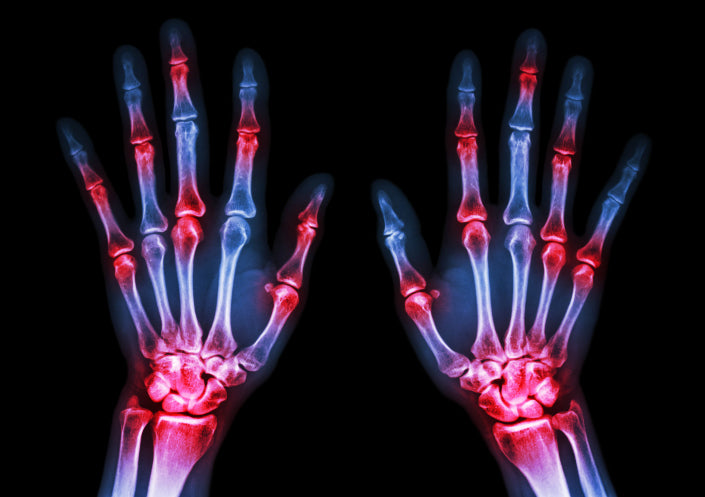Arthritis is the top cause of disability in the United States, and most affected people suffer from its debilitating symptoms—chronic pain, swelling, difficulty moving—on a day-to-day basis. It can affect anyone regardless of age, gender or ethnic background. And arthritis isn’t just a problem for the elderly. In actuality, two-thirds of people with arthritis are under age 65, according to the Arthritis Foundation.
Medicine has no cure for arthritis, but with the proper resources, your body can overcome it and/or prevent it from developing.
If you find yourself or a loved one experiencing joint pain and are ready to turn things around, take action with our Arthritis Get Started Kit. Read on to discover the natural solutions for arthritis as well as its causes and symptoms.
Arthritis is defined as inflammation of the joints, which can be caused by degeneration, infections, the immune system and other factors. The term “arthritis” is not just a single disease; it actually refers to more than 100 different types of arthritis and related problems.
May is Arthritis Awareness Month. Spearheaded by the Arthritis Foundation, the annual campaign focuses on informing the public about arthritis, joint pain and joint disease.
Here are some statistics about arthritis in America from the Arthritis Foundation:
- Arthritis is more common in women (especially rheumatoid arthritis), and people older than 65 have a higher risk of developing a form of the disease.
- About 53 million adults have been diagnosed with arthritis by doctors.
- Arthritis and rheumatic conditions affect nearly 300,000 babies and children.
- Arthritis and related joint conditions account for $156 billion annually in lost wages and medical expenses.
What is arthritis?
Arthritis is the inflammation of the joints, but let’s first take a look at how joints work. A joint is the point of connection where one bone moves on another. Ligaments are like elastic bands that hold the two bones together, keeping the bones in place while your muscles relax or contract to make the joint move. Cartilage covers the surface of the bone to keep the bones from rubbing against each other, which also helps the joint do its job without causing pain. Inside the joint, the joint cavity houses the synovium on its membrane walls, which produces synovial fluid to nourish the joint and cartilage. Arthritis occurs when something isn’t working correctly with your joints, caused by various factors that determine what type of arthritis you have.Categories of arthritis
There are four main categories for arthritis, although many autoimmune diseases contain symptoms of arthritis as well. Some forms of arthritis affect more than the joints--they can also cause problems with the heart, eyes, kidneys, lungs and skin.- Degenerative/Osteoarthritis. This is the most common type of arthritis. It develops when the cartilage--the tough but flexible tissue that cushions the end of the bones—diminishes, so that bone rubs against bone. This causes pain, swelling and stiffness that may become chronic over time. Risk factors might be age, genetics, being overweight or previous injuries.
- Inflammatory Arthritis. Much like other autoimmune diseases, inflammatory arthritis occurs when the body’s immune system triggers the release of white blood cells to fight off foreign invaders (such as bacteria or viruses) when there are no threats present. Essentially, the body causes damage to its own tissues. The increased number of white blood cells in the joints can cause cartilage damage, irritation or swelling. Early diagnosis for inflammatory arthritis is crucial, and the goal of treatment (generally, disease-modifying anti-rheumatic drugs, or DMARDs), is intended to slow down the process and prevent permanent joint damage. But, is medical intervention the answer?
- Infectious/Septic Arthritis. In this type of arthritis, bacteria, viruses or fungi enter the bloodstream from another part of the body and into the joint, causing pain and inflammation. Examples include bacteria such as salmonella that causes food poisoning or hepatitis A, B and C. Children, the elderly and those with other conditions such as cancer, diabetes and immunodeficiency disorders are at higher risk of developing septic arthritis. Common symptoms of joint pain, swelling and fever usually come on rapidly and are intense. Antibiotics can be helpful in clearing the infection, but sometimes arthritis symptoms linger and have the potential to become chronic. Note: Any time antibiotics are used, it is wise to use probiotics to help minimize destruction of the critical friendly flora.
- Metabolic Arthritis. This type of arthritis occurs when too much uric acid is produced as the body breaks down substances called purines, found in human cells and animal source food. Some people naturally produce more uric acid than needed, which can result in buildup that forms needle-like crystals in the joint and causes severe pain or gout. According to the Mayo Clinic, “Gout is characterized by sudden, severe attacks of pain, redness and tenderness in joints, often the joint at the base of the big toe.” Gout can come in episodes or become chronic and debilitating.
The most common types of arthritis and arthritis-related diseases in America
- Rheumatoid arthritis (RA) is a chronic inflammatory arthritis that occurs on both sides of the body, such as both hands or both feet. RA affects 1 out of 3 adult Americans. Although more women are diagnosed with this form, men generally have more severe symptoms of pain, swelling, stiffness and fatigue.
- Juvenile arthritis is the umbrella term for arthritis in children. About 300,000 American children under age 18 have arthritis or other related conditions. The most common form is juvenile idiopathic (“from unknown causes”) arthritis. Children experience symptoms of pain, swelling, stiffness much like other autoimmune diseases associated with arthritis.
- Fibromyalgia is a condition marked by symptoms of chronic pain, fatigue, mood changes and memory problems. It affects 3.7 million Americans--mostly found in women between 40 and 75 years old. Symptoms can be managed through natural remedies or medications, but it does not lead to joint damage.
- Lupus is a chronic autoimmune disease caused by an overactive immune system that is widespread over the body, including the joints, kidneys, brain and other organs. Lupus affects more than 1.5 million Americans and is most common in women--in fact, the Arthritis Foundation says 9 out of 10 adults with Lupus are women between the ages of 15 and 45.
How can arthritis affect you?
People suffering from arthritis can experience mild, moderate or severe symptoms that are off and on or persistent. Severe forms of arthritis can result in chronic pain and loss of the ability to do everyday activities, even making it difficult to walk.The most common arthritis symptoms are:
Pain - When the cartilage on the joints wear away, your bones rub on each other, which can cause intense pain every time you move. Chronic pain (lasting more than 3 to 6 months) can also have long-term effects on the brain. When your brain is continually sending pain messages, the neurons become more efficient in delivering those messages. You brain can begin to misread a small pain for one that is larger, which makes the problem persist. Proteolytic enzymes used on an empty stomach may help the body modulate inflammation. Serrapeptase, a unique proteolytic enzyme, is part of the Arthritis Get Started Kit. Swelling & Inflammation - Inflammation occurs when either the synovium (the lining of the joint) swells or its fluid increases in volume. Inflammatory cells and extra blood enter into the joint and inflammatory proteins, or peptides, enter the soft tissues surrounding the joint. The additional inflammatory molecules and blood make the joint appear swollen and warm, and cause joint fluid to stick around the joints, which further increases swelling. Our Joint Health supplement consists of 100% natural, plant-based ingredients that help support the body in achieving an appropriate inflammatory response and rebuilding cartilage. Stiffness/Decreased Range of Motion - If you’ve ever woken up to find it hard to move a finger, leg or arm, you’ve experienced stiffness. Damage to the joints, which occurs in osteoarthritis, could result in stiffness and make it more difficult to move your limbs. Stiffness is not always accompanied by pain, and recurring stiffness could be an early indicator of RA. Redness/Irritation - The inflammatory agents that cause swelling can also produce redness because of the increased blood flow to the joints. Rashes can occur in certain types of arthritis, including RA. Vasculitis and psoriatic arthritis (psoriasis) can also develop into skin rashes that can cause redness, itching and irritation. Fatigue - When you have arthritis, inflammatory proteins in the blood are released, which in turn cause fatigue. Fatigue in arthritis patients could also be a result of medication side effects, anemia, lack of sleep, depression or other medical conditions. Additionally, chronic pain and fatigue go hand in hand. Dealing with pain symptoms daily can tire you out, and in turn, being fatigued can make pain worse.The Arthritis Solution: Change Your Lifestyle, Reduce Your Pain
Arthritis can strongly impact the quality of life and is often debilitating. There is no medical cure for arthritis--even though some people undergo surgery for joint replacements, sometimes the arthritic symptoms don’t go away. There are several natural options to naturally help your body reduce symptoms such as pain, stiffness and inflammation, as well as bring back the range of motion that is lost in more serious cases.- Eat a whole foods, plant-based diet. Many cases of arthritis are due to preexisting autoimmune conditions, where the immune system is attacking itself. Good nutrition can help improve your body’s metabolic functions and flush out toxins that are harmful to your health. The Hallelujah Diet’s combination of 85% raw and 15% cooked foods can help you maintain a healthy weight and jumpstart your body’s self-healing abilities by building a healthier immune response.
- Regular physical activity can help your joints stay flexible. The Centers for Disease Control and Prevention (CDC) recommends moderate exercise (with the goal of 150 minutes per week) for arthritis patients, stating that it “can reduce pain, and improve function, mobility, mood and quality of life for most adults with many types of arthritis including osteoarthritis, rheumatoid arthritis, fibromyalgia and lupus.” A 2006 Canadian research overview showed that regular physical activity helps reduce the risk of many chronic diseases, including joint disease. Furthermore, exercise helps promote weight loss--if you’re obese, losing weight can help reduce the stress on your joints.
- Pain management. Physical therapy and proper exercises that don’t put too much extra pressure on the joints are helpful in managing your pain. Warm water therapies work well for musculoskeletal pain, as they can help relax and loosen the joints.
- Stay positive. Another way of managing your pain is to maintain a good attitude toward it. Many people with chronic arthritis pain can find it to be mentally enervating, but a positive attitude can increase your ability to cope with the pain. Continue doing things you enjoy, like spending time with your loved ones and praying to God.
- Supplement your nutrition. To further improve your immune system, boost your energy and maintain healthy blood sugar levels with supplements geared toward fighting arthritic symptoms to help improve your quality of life.

- Serrapeptase - The proteolytic enzyme supports the body in achieving an appropriate inflammatory response, and supports optimal blood flow. Serrapeptase may be used freely—one to five capsules as needed on an empty stomach for optimal effectiveness.
- Joint Health - Consisting of 100% natural, plant-based ingredients, the dual-action formula supports your body’s efforts to rebuild cartilage and to maintain an appropriate inflammatory response at the same time.
- BarleyMax - The green juice superfood powder will strengthen the immune system and boost your energy levels. BarleyMax is the signature product of The Hallelujah Diet and is the most nutritionally dense broad-spectrum living food product on the market.
- Fiber Cleanse - A complete, full-body detoxification with a balanced blend of 28 herbs to help cleanse the colon and restore optimal bowel function.
- The Arthritis Foundation: www.arthritis.org
- “Gout,” The Mayo Clinic: www.mayoclinic.org
- “Arthritis,” Centers for Disease Control and Prevention: www.cdc.gov
- “What is arthritis? What causes arthritis?” Medical News Today: www.medicalnewstoday.com
- “Arthritis,” WebMD: www.webmd.com
- Health Benefits of Physical Activity: www.dr-walser.ch







